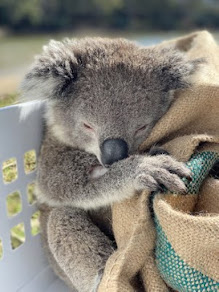 |
| Credit: Tara Gatehouse |
One of UQ’s leading COVID-19 vaccine researchers, Associate Professor Keith Chappell, has discovered that the chlamydia epidemic plaguing endangered koala populations in Queensland and NSW is linked to a common virus that likely suppresses koalas’ immune systems.
Dr Chappell and Dr Michaela Blyton, from UQ’s Australian Institute for Bioengineering and Nanotechnology and School of Chemistry and Molecular Biosciences, made this discovery after studying more than 150 koalas admitted to Currumbin Wildlife Hospital.
Dr Chappell said this study could have far reaching impacts and lead to better protective measures like breeding programs and new anti-viral medications.
“We know Queensland and NSW koala populations are heavily impacted by chlamydia infections and a retrovirus, but until now a clear link between the two has not been conclusively established,” Professor Chappell said.
“Our research has found that the amount of retrovirus circulating within an animal’s blood was strongly associated with chlamydia and symptoms like cystitis and conjunctivitis, as well as overall poor health.
“It’s a double whammy for already-endangered koalas.”
Dr Chappell said they found high levels of the virus increased a koala’s risk of chlamydia by over 200% per cent.
“There is no question that koala retrovirus and chlamydia are connected, and we believe the retrovirus suppresses the koala’s immune system, making them more vulnerable to disease.”
It was previously assumed that a particular subtype of koala retrovirus may be more capable of causing disease, but this research has found that all the subtypes increase disease and has further highlighted the urgent need to stop the virus circulating within koala populations.
Dr Blyton said while these findings highlighted another threat facing endangered koalas, it could also lead to new ways to treat populations and reduce the risk of extinction.
“It is deeply concerning that koalas are facing environmental pressures at the same time as biological threats from a retrovirus and diseases,” Dr Blyton said.
“The findings from this study are important for conservation, especially as the koala is now listed as endangered and wild populations continue to decline in Queensland and NSW.
“Research like this helps us understand how the threats facing koalas are interlinked, so we can help find ways to protect the species going forward and closely examine the success of anti-viral medications and breeding programs.”
The UQ team now intends to study how environmental factors influence the amount of circulating retrovirus and disease in koalas.
Currumbin Wildlife Hospital Senior Veterinarian Michael Pyne said this was an important project and he was excited to have been working alongside the University of Queensland for so many years.
“This is a major step forward in understanding how retroviruses can affect koalas and the link with other disease, and is a perfect example of the importance of research when saving endangered species.”
This study has been published in PLOS Pathogens.
Source/Credit: University of Queensland
vet05242201







.jpg)